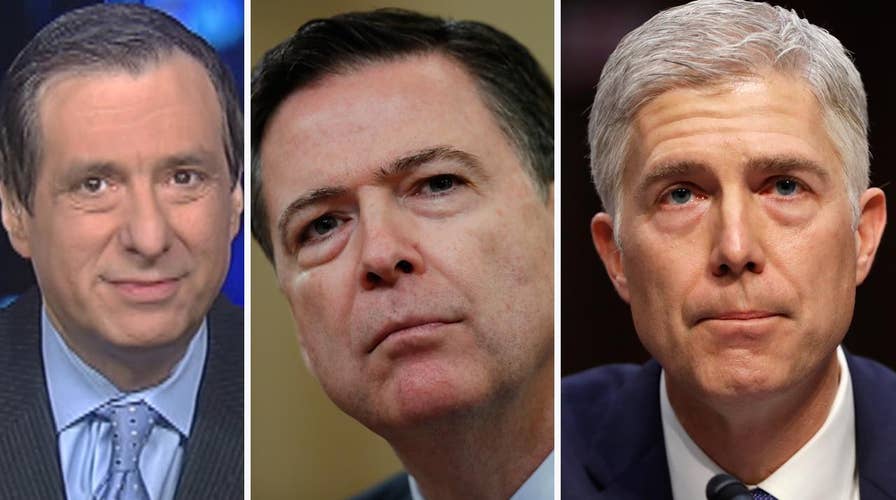Kurtz: Split screen -- Comey overshadows Gorsuch
'MediaBuzz' host Howard Kurtz weighs in on the media putting the spotlight on FBI Director Comey over Supreme Court nominee Gorsuch
James Comey didn’t want to say much yesterday on Capitol Hill, but for President Trump’s opponents, he said enough.
House Republicans wanted to focus on illegal leaks of classified information, scoring some points on that issue.
And all this managed to overshadow the first day of Neil Gorsuch’s Supreme Court confirmation hearing, a reflection of the depth of this Washington obsession.
Eight words from the FBI director—“I have no information to support those tweets”—knocked down the most controversial claim of Trump’s presidency.
Comey also said a president has no power to order a wiretap, which dismisses the Trump charge that Barack Obama had set the alleged wiretap in motion.
By confirming that there is an FBI probe of contacts between Trump associates and Russia—which we already knew—Comey appeared to give ammunition to the president’s opponents. It wasn’t a “bombshell,” as some headlines had it, but it’s now official.
In other news that we already knew, Comey said the Russians wanted to damage Hillary Clinton and thereby help the Trump campaign. And Clinton people are upset that the Trump/Russia probe remained secret while Comey talked about reopening the Hillary email inquiry in late October.
But there is more to the story and the way it is being covered.
The Intelligence Committtee hearing was highly partisan, with Democrats asking Comey all kinds of questions, many based on news reports, that he insisted he could not answer. They were obviously trying to get it all on the public record and raise suspicions for the viewing audience.
As for the Republicans, they kept pressing, but didn’t get anywhere, for information on how Michael Flynn’s name was leaked over the contacts with Russia’s ambassador that led to his firing for not being truthful.
This dovetailed with some early-morning tweets from Trump, who said the Democrats “made up and pushed the Russia story” and “the real story that Congress, the FBI and all others should be looking into is the leaking of Classified information. Must find leaker now!”
So now the media have two related situations in which there is no evidence of wrongdoing.
The one making big headlines, more than two weeks after Trump’s allegations, is that the FBI has nothing to support the notion that Obama directed some kind of 2016 surveillance against Trump.
The other, which has gotten little traction in the press, is that the FBI has found no evidence of improper collusion between the president or his associates and Moscow.
White House Press Secretary Sean Spicer made this argument to me in a “Media Buzz” interview, saying the press is pushing a “false narrative” by not equally emphasizing the lack of evidence in the Russia probe. Of course, the White House press secretary wanted to focus on the Russian part of the equation while deferring to the intelligence panels on the wiretap claims that his boss has been unable to substantiate.
Now critics can say that the reason there is no evidence of collusion between Trump World and the Putin government is that Comey remains tight-lipped about an ongoing investigation. But in this leaky environment, it’s hard to imagine that damaging material, if it existed, wouldn’t have made its way into the press.
Based on Comey’s testimony, this thing could drag on for months. But the media should apply the same standards to both questions: Make no damaging assumptions unless there is proof.
And then there was this, in mid-afternoon: Gorsuch delivered his opening statement to a Senate committee, which was carried by Fox, while CNN and MSNBC stuck with the Comey hearing. Two big stories, no question, but hard to imagine that the opening day for a Supreme Court nominee wasn’t the day’s headline grabber.





